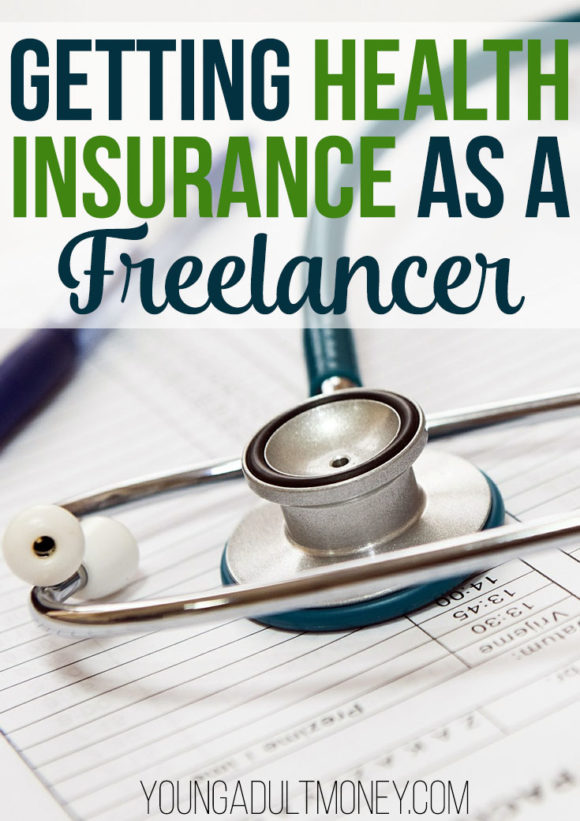 Being your own boss sounds like a dream to most people.
Being your own boss sounds like a dream to most people.
You can work from home (or anywhere in the world), set your own hours, work on what you want with clients you like, and enjoy a ton of flexibility.
While there are certainly many upsides to self-employment, there are still downsides to being a freelancer, namely, when it comes to taxes and healthcare.
Anyone who has a side hustle knows what a pain paying estimated quarterly taxes can be.
Well, finding affordable health insurance as a freelancer can be equally painful.
Navigating Health Insurance as a Freelancer
This topic hits close to home for me, and is something I’ve been worrying about since the beginning of this year.
Why? As of my birthday, I’ll no longer be eligible for my parent’s health insurance plan.
Yes, I’ve been spoiled; I’ve never had to pay for health insurance coverage, which made the transition to self-employment an easy choice for me.
Most people need to consider this cost when thinking about leaving their 9 to 5. The benefits you have from your employer are a luxury. You lose all of that when you switch to freelancing, and you shoulder a heavier tax burden on top of that.
Yes, your income potential is technically unlimited, but if you’re just starting out, the cost of health insurance and taxes and any other materials you need to start your business can be intimidating.
Whether you like it or not, being your own boss literally means just that: you’re responsible for everything your employer used to handle for you.
Now, I’m not trying to burst any bubbles. Self-employment is still pretty awesome, but it’s important to have realistic expectations when going into it.
Those of you freelancing already may be in a similar position to mine, or maybe you’re losing your existing health insurance coverage and are looking into your options.
Whatever the case may be, I hope this guide can help give you a better idea of how to navigate health insurance as a freelancer.
The Low-Down on Health Insurance Coverage
First off, it’s important to understand the different types of health insurance coverage available.
You may have heard about the different tiers (bronze, silver, gold, and platinum), and you’ve likely heard about “catastrophic” plans.
What the heck does any of that mean?
Put simply, lower tiers have lower premiums, so you’ll pay less each month, but you’ll have to pay more out-of-pocket for services.
The higher the tier, the higher the premiums, but you’ll pay less out-of-pocket.
So you essentially have two choices: pay now, or pay later.
To figure out which plan works best for you, I highly recommend taking your health condition into consideration. Since many of you reading are likely on the younger side, you may be tempted to go with a catastrophic plan, or a lower tier. DC has explained why that might not be in your best interest.
Yes, you may have lower premiums, so it’s less of a burden right now, but what if a medical emergency occurs? If your deductible is in the $3,000+ range, are you able to afford that with your emergency fund? Do you want to have to pay that out-of-pocket? Or would you rather pay for the peace of mind?
Additionally, don’t just take your present condition into consideration. If you’re thinking of having a baby in the near future, or having surgery for an injury that’s bearable for now, that’s something you want to plan for.
Personally, I have a history of health issues. I’ve had surgery and out-patient treatments over the past few years, and I wouldn’t sleep well knowing I’d be on the hook for thousands of dollars in treatment if anything happened.
Then again, I’m a worrier, and I have a large emergency fund to reflect that. Your stance on emergency funds is probably a good indicator of what type of plan you should choose, as it’s a nice reflection of how comfortable you are with financial risk.
Do I Really Need Health Insurance as a Freelancer?
Yes, unless you want to pay a penalty.
This answer doesn’t sit well with a lot of people, but it is what it is.
How much is the penalty?
In 2016, it’s either 2.5% of your household income, or $695 per adult, and $347.50 per child under 18 – whichever is higher, according to healthcare.gov.
There are some exemptions, and if you’re covered for part of the year, you won’t have to pay the full fee. I recommend talking it over with your accountant if you’re thinking about it, but remember that not having coverage leaves you vulnerable.
Where Can I Find Health Insurance Plans?
The easiest way to shop for health insurance is on the marketplace. You can quickly navigate to the plans available to you on healthcare.gov.
You can also check out the websites of individual providers if you want to shop around further.
Lastly, Freelancers Union (a non-profit) offers benefit packages you can review.
What if I Can’t Afford it?
You’re not alone in your worries. In anticipation of needing coverage, I did a little research and discovered that a silver plan would cost me $260 per month. That’s more than the minimum required payment I make on my student loans.
This can be a shock to anyone’s budget, especially if you’re trying to provide coverage for your entire family. I remember quite a few freelance bloggers who wrote about their premiums skyrocketing when Obamacare was released.
If you make under a certain amount per year, you might qualify for a subsidy. To estimate what your savings and credits might be, the Kaiser Family Foundation has a calculator you can use.
Keep in mind that your healthcare costs are based off your (projected) net income for this year – NOT last year. I know estimating can be difficult, but do your best. Healthcare.gov has an explanation on how to estimate your expected income, along with the savings you can expect.
Don’t Forget Dental and Vision Coverage
These are optional and you’re not required to have them, so again, take your needs into consideration.
Have you had dental problems recently? Any toothaches? You’ll want to opt for coverage. Dental work is expensive, even with insurance, and it’s better not to take any chances.
If your vision is perfect (I’m jealous) then you might forgo this coverage, but if you have a prescription and need to get an annual exam, look into whether or not coverage is worth it.
When Can I Apply for Health Insurance Coverage?
Typically, you can only sign up for health insurance during the open enrollment period (which, at the time of writing, is over). However, there are quite a few exceptions.
My scenario is a good example. Because I’m losing coverage halfway through the year, I qualify to enroll: “aging off a parent’s plan by turning 26” is actually a reason listed. (Oh the joys of getting older.)
To see if you qualify for an exemption, you can go through this screening process.
Please note that you can’t simply change your plan in the middle of the year because you decide you want different coverage. You’re locked into whatever plan you choose for twelve months, until the next open enrollment period happens, unless extenuating circumstances occur.
What if my Business Has Employees?
The information contained here is for those who are self-employed by the definition of the marketplace. That means if you have any employees, you’re considered a “small business” and will need to research health insurance options on the SHOP Marketplace.
I Have Other Questions!
That’s great – seriously. There’s a lot I can’t cover within the scope of this article because the issue of health insurance is so complex.
I highly recommend doing your due diligence and researching the heck out of it however you can. It’s that important to your well-being (and wallet).
The Kaiser Family Foundation has an excellent FAQ on its website that you should read if you have any other questions, like what benefits are covered, what’s not covered, what co-payments to look out for, which plans offer out-of-network options, etc.
_________________
Navigating health insurance as a freelancer can be intimidating, especially if you’re used to being on someone else’s plan. The best thing you can do is research all your options thoroughly so you can make an informed decision. Just remember that it’s likely not worth skimping on health coverage.
If you’re a freelancer, what has your experience with getting health insurance been? Are you having to look for health insurance soon?


We belong to Liberty Healthshare, a health sharing ministry now. We actually don’t qualify for any health insurance plans right now as we travel full-time, so no one wants us, haha. Luckily, Liberty has been great so far!
Oh wow, that’s crazy you don’t qualify for any traditional plans! Thanks for bringing both of those points up – I’ve heard good things about health sharing ministries, too.
I’ve shared about our experience, but health insurance has been a mess for us – as it has been for many. We basically have fire insurance so we’d benefit if something catastrophic were to happen. We have seriously looked into a healthcare sharing ministry but haven’t pulled the trigger on it.
Sounds like something I need to look into as well. It’s so unfortunate that the cost is astronomical for families. Who knows, maybe it will improve down the road, but I won’t hold my breath!
Great stuff in this post Erin and it’s definitely something I need to look into this year. Like Michelle, I’m with Liberty HealthShare and I also pay for a separate dental health plan since Liberty can only provide dental discounts through Careington. There’s no tax benefits with a health sharing ministry though :( I’m not sure if I should stick with them when start freelancing full-time or try my luck with traditional insurance.
Interesting, I’ll have to look into it and compare! I think, when you’re a freelancer, it makes sense to shop around and figure out what options you have. Even with traditional insurance, employers usually offer a variety of plans, and it’s a good idea to run the numbers to see if you should take a plan with a higher premium/lower deductible or lower premium/higher deductible.
Great article, it is refreshing to read an article which explores one of the large, common struggles freelancers face when moving from ‘9-5’ jobs to self employment.
I have immediate family members who are self employed and use Kaiser Permanente. It seemed great at first but the longer they have been using the insurance the more dissatisfied they are becoming.
Glad you enjoyed it, Lisa! Oh no, that’s not good, but thanks for sharing. Hopefully they find something a little better. It can be a hassle to deal with insurance providers.
That’s a very true statement, Jaime! It is risky to go without health insurance; you never know when you might need it.
This is a very good point, being a freelance can make things more complicated, as well as trying to get a loan. We’re lucky in Australia to have a system where we’re mostly covered by the Govt, so if I ever truly go freelance, I still have that health cover. Lots of good tips in there Erin, I enjoyed reading through it and getting the American perspective. :)
Tristan
As others have already mentioned. We too belong to a health share ministry. We haven’t had to use it yet so I cannot compare it to traditional insurance. But our premiums are significantly lower for a family of 3.
Our monthly premium in 2016 was going to be about $550 for a private Bronze-level plan. The Marketplace plans weren’t much cheaper without the tax credit & you are extremely limited on your choice of doctors as well.